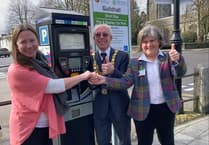A SOLAR farm was given the go-ahead by West Devon planners this week, despite fears that it would urbanise the rural countryside.
Planners voted by five votes to four with one abstention to approve the scheme for 1.6 hectares of pasture land at Pittsworthy Farm, Thorndon Cross.
The application by Mr P Davidson provoked strong opposition from members of the local community and Sourton Parish Council because of its visual impact, commercial nature and lack of information and consultation. They opposed the change of use of land where there was an agricultural demand.
But members of West Devon Borough Council's planning committee were told this week that the one-megawatt scheme was small as solar farms went, it would be well hidden by trees and the council 'should not turn its face away from the future'.
A bid to build a 2.8-megawatt solar farm at Highampton was turned down by West Devon planners last month because of visual impact and scale.
Cllr Donald Horn said the site at Thorndon Cross might be out of sight and perhaps out of mind but would it be allowed in a secluded valley of Dartmoor National Park?: 'I do not think so, nor do I think that West Devon would allow any industrial development on this site or a residential dwelling for a local family.
'We have policies to protect the countryside and we should be using these to object to this application.'
Cllr John Hockridge said the application had been the subject of a public meeting in the Thorndon hamlet and it was quite clear that, locally, there was very strong opposition to it.
He said:?'I am supporting the objections because we would be bringing urban development in the rural countryside.
'We have a responsibility to protect the countryside and keep it as much as possible in a natural state.'
He said if the scheme was approved he would like to see an alternative access road to the site, on the other side of the field and further away from the hamlet, to alleviate the concerns of residents who would be affected by the three months of construction traffic.
But the committee was told that the access road, which involved building a bridge over a stream, was an integral part of the application. A separate access road would require a separate application.
Vice-chairman of the planning committee Philip Sanders said this was not the best agricultural land anyway, but rather than destroying it the scheme would probably preserve it.
The panels were raised so that the land could still be used for grazing and the site would be returned to its original state in 25 years.
He said:?'The number of solar panels you see on domestic and industrial buildings is increasing.
'These are new technologies and we have energy issues in this country. We cannot turn our face away from the future.'
Cllr Terry Pearce said this was one of the less intrusive sites for a solar farm that the planning authority had seen in recent months and neither Natural England nor the Devon Wildlife Trust had raised any objections.
Resident Charles Watton said the site was at the head of an unspoilt valley and the trees protecting it were deciduous, leaving it exposed in the winter. He also said the security lighting would be triggered by foxes and deer.
Agent for the applicant Anthony Carthy said once the site was constructed people would not be aware of it.
'It is very much in line with Government and regional policy on renewable energy,' he said.



